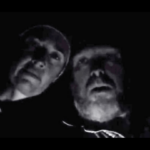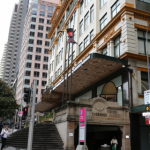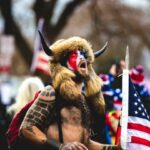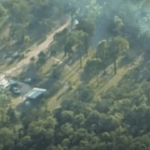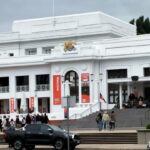Rejecting Your Strawman: Dr Kaz Ross on the Rising Sovereign Citizen Movement
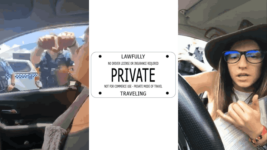
About a fortnight ago, footage of a young woman from Victoria being pulled over by NSW police was doing the rounds online, due to the driver’s strange responses to officers’ questioning.
When the police officer standing at the driver’s window asked which state the woman’s licence was from, she responded that she was “private”, which meant she was not “under any public law”, but instead she was operating under the “lore, l-o-r-e”.
The driver further explained that her Victorian licence plates weren’t being displayed because she is “going sovereign”, and she’s “slowly removing herself from under” the police “corporation”, which is a part of the government that collects money.
While what this woman sets out to police is confusing, for those who have been aware of the rise in the local sovereign citizen movement, she’s clearly an adherent, and social media commentators lament below the clip that the sad thing is there are more like her out there.
And they were spot on, as it only took another week before this footage emerged of NSW police officers pulling over some more sovereign citizens. This time a middle-aged pair refused to comply with orders, claiming police had no jurisdiction, which prompted an officer to rip the window off their car.
Common law adherents
Those pulled over by police in the footage are adherents of the sovereign citizen movement that developed in the US in the early 1970s under William Potter Gale, who was an extremist Christian that considered whites superior to nonwhites and asserted that Jewish people were plotting to take over the world.
But sovereign citizen ideology goes further in so so far as it rejects the legitimacy of the system of laws created under the jurisdiction of the governments they live under.
Sovereign citizens in the US therefore consider the United States government to be illegitimate and believe that its laws don’t apply to them. And that’s exactly what the women in the recent Australian footage were attempting to convey to the NSW police officers that pulled them over.
But while sovereign citizens reject statutory law, they consider the body of common law underlying their nation’s justice system to remain in place, often pointing to the Magna Carta, a 1215 British royal charter of civil liberties, as well as the 1688 UK Bill of Rights, to shirk what would otherwise be their legal responsibilities.
The sovereign citizen movement became more pronounced in this country 12 months ago, when a group of far right actors, which included those who were “going sovereign”, attempted to burn down the front doors of Old Parliament House in Canberra.
A deadly threat
But prior to the recent police traffic stops that reveal how the sovereign citizen ethos pans out when confronted with those empowered with authority, the dangers of the movement became apparent after three members of the Train family had a deadly shootout with Queensland police in December of last year.
Indeed, independent researcher into far right groups and extremism Dr Kaz Ross warns that while last month’s far-right Reichsburger plot to overthrow the German government might seem extreme, there has been reactionary mobilisation in this country that could pose a future threat.
Sydney Criminal Lawyers spoke to Dr Kaz Ross about what the sovereign citizens in the police traffic stops are actually talking about, how the pandemic has emboldened the local far-right to crawl out of the shadows, and how extremist movements organising here have similarities to those in Germany.
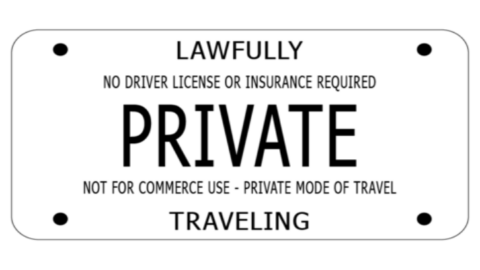
Firstly, over the last couple of weeks, there have been two pieces of footage circulating on social media that show sovereign citizens being pulled over by NSW police.
These incidents see these people refusing to comply with the orders of officers because they don’t recognise their jurisdiction. One woman had removed her Victorian number plates, while the other repeatedly asserted that she wasn’t “driving” but was instead “travelling”.
For a lot of people without any understanding of the sovereign citizen movement, these individuals don’t make much sense. Dr Ross, are you able to shine a light on what’s occurring during these traffic stops?
The two traffic stops encapsulate some of the core elements of the sovereign citizen movement.
First of all, just a note about the name: often the people we call sovereign citizens themselves reject the name sovereign citizens.
They might call themselves sovereigns. They think sovereign citizen itself is an oxymoron, because they don’t see themselves as citizens of Australia.
These people see themselves outside of the political system that is Australia. There is not really a better name for them. Some call them pseudo law adherents or common law adherents.
Personally, I use sovereign citizens because it sums up what they’re about. But sovereign anti-citizen might actually be a closer term.
In these two particular incidents, we see the basis of their thinking, which is that they do not legally have to comply with any laws or orders given by Australian police.
They reject the government as illegal. This is common amongst the sovereign citizen movement right across the world.
But they have their own different ways of doing this in different countries, and even within Australia, we have a couple of different frameworks going on.
Some of these groups may say the Constitution is illegal, or that in the 1970s, Australia became a corporation, and therefore, it is no longer a country and it can’t make these laws.
Some say the paperwork was done incorrectly at federation. Others say we need to go back to 13th century UK and the Magna Carta as the basis for law.
Another group rejects that all together. They say they are not bound by the law because the colonisation of Australia was illegal and, therefore, the only sovereigns on this land are Indigenous people and, that being, they do not have to follow the NSW police.
In the two examples, we see two different types of sovereign citizens. Both reject the government, the laws and the police.
Both accept the basic understandings of sovereign citizens, which is when you are born a legal entity is created for you. You get a birth certificate, which has your family name in capital letters, which then creates what they call your “strawman”.
So, they make a distinction between you as a living person, and this legal entity, which is also you. This legal entity, or this strawman, is the one that’s being subjected to the fines and regulations.
They reject the strawman. They make a declaration declaring themselves separate from the strawman, or their legal entity.
Therefore, they declare themselves to be living men or living women, which means they reject the legal entity, and therefore, they’re outside the legal system.
They then refuse to “contract” with people. So, often the police will say things to them like, “Do you understand?” And for them that is code for saying, “Will you contract with us in our legal system?”
So, they refuse to say that they understand, because they refuse to contract with the legal system.
In their mind, they’re like members of a completely different country or nation that stands outside the legal system. So, they don’t accept contracting with the government.
Contracting with the government might be things like getting a licence or having number plates on your car.
Part of the journey to becoming a living man or living woman is to make the declaration that you are moving away from your strawman.
You will see the younger woman in the footage holding up her ID card that she’s got, which is recognition of her identity. She uses the name “so and so” of family “such and such”. So, they adopt this clan notion that they are “so and so” of the “whatever” clan.
For them, they are not going to contract with the police by obeying and also, they have this crazy notion in this common law world, which is that driving is when you are engaging in a commercial activity on a road.
So, if you’re in a vehicle and you are “driving” that means you are a “driver” and that is your occupation. But if you’re not driving, you’re not bound by any laws, but you are “travelling” on the road and you have the free right to travel on it.
These two examples show the idea that the living person should not contract with police by obeying or going along with what police have to say.
In the case of the other woman, the older woman, she is very much embedded in the Indigenous sovereign citizen movement. And for them, they follow what they call lore, l-o-r-e, Indigenous lore, rather than the Australian law, l-a-w.
That is why they often say, “I don’t follow the law, l-a-w. I only follow the lore, l-o-r-e.” That is because in their mind, they are a member of a micronation of Indigenous people and their allies.
In fact, her status is that she is considered to be a diplomat in her community. So, they talk about her as a diplomat and that the pullover was in breach of the Geneva Convention, because you can’t detain a diplomat legally for 24 hours in the lockup.
In their minds, she is a diplomat from a micronation that has different laws, and she is following that lore, and therefore, the police have no right to lock her up on trumped up charges involved in the arrest warrant that’s out for her in breach of an AVO.
Much of the public only became aware of sovereign citizens and the dangers they pose when three members of the Train family had a shootout with police at their Wieambilla property on 12 December. Six people were killed during the incident.
Queensland authorities refused to classify the event as an act of terrorism. How do you consider what happened on that day?
The Train family are an example of when this antigovernment sentiment goes to an extreme.
Sovereign citizens are mainly a danger to themselves, because they don’t pay fines or rates, they don’t comply, and they often have their property taken away from them or they face financial penalties.
So, they’re usually a danger to themselves. And in the case of driving without a licence or registration, they’re a danger to others, because they’re not covered by road insurance.
But, in the case of the Trains, they represent another element of this antigovernment sentiment, where the idea is that the government isn’t just illegal but it’s out to get you.
The government is an overbearing, out of control, oppressive regime that’s using all kinds of methods to track dissidents.
From what I have seen on social media from the Trains videos is they really believed the government was not only illegal but it was actively pursuing them on purpose and persecuting them in fact.
In this kind of world of conspiracy thinking, something like chemtrails, which are just the vapour trails from an aeroplane, are seen as acts of geoengineering from the government. They could be spraying vaccines on you, or they could be poisoning you.
In the case of the Trains, they were at the extreme end, seeing these sorts of coincidences or benign things happening to them, as evidence of a plot.
Clearly, they had had interaction with police before, and so they were paranoid and suspicious. In their case, they don’t seem to have been a part of an organised sovereign citizen movement. But they were definitely hooked into the worldwide apocalyptic Christian movement.
In that community, particularly in the US, there’s strong support for guns and a strong antipathy towards officials, particularly police.
So, we see tragic results when these people literally dig in on the land, with an entrenched position that it is a fight to the death with police.
Whether or not it counts as terrorism, certainly antipolice sentiment has been on the rise over the last couple of years over lockdowns and mandates.
Places like Queensland actually got off pretty lightly in terms of mandates and lockdowns compared to places like Victoria.
But in terms of terrorism, I don’t see any evidence of an actual plot or even a political motivation. If anything, there was a religious motivation that was fuelled by conspiracies.
Word that the sovereign citizen movement was beginning to take hold amongst a small group of people in this country began circulating during the COVID era.
As part of your academic work, you monitor the online activity of the far right in this country. So, in your understanding, how long has the sovereign citizen movement been active here? And should we be expecting more of these incidents that are starting to occur?
During the pandemic, people were trying to understand these new mandates and laws that were coming in. There were COVID fines and there were curfews.
That provided a great opportunity for these people pushing common law to come in and say these laws are illegal and the government is illegal, and therefore, when you go to court you can challenge your COVID fines.
The common law adherents, particularly those selling common law booklets, did quite well during the pandemic.
The idea that the laws that we are under can be challenged, should be challenged and are illegal and unlawful, really gained widespread traction during the pandemic as people were seeking to understand what was going on.
This brought with it another framework. So, we see during the pandemic that people had an explanation as to why things were as they were and latching onto it.
During that time, a number of different conspiracy theories melded together. QAnon morphed away from Donald Trump and combined with other conspiracies around paedophiles in government.
So, suddenly, during the pandemic period, we saw people going to protests, who were interested in what was going on, then being told not to follow the media, because they’re not telling the truth.
They said look at all these conspiracies, there are all these paedophiles in government, a global elite, who are controlling us and constraining us with these laws that are illegal, and we should rise up and fight them.
The common law adherents started a whole group of people looking to understand what was going on, and the understanding of conspiracies, like the government being illegal, became widespread amongst that group of people.
So, we are going to see more of these challenges, with people trying to form a different way around what they see as an illegal government.
Often these things show up in the courts, and magistrates are shaking their heads in exasperation when they get these sorts of people in court, because they often bring really detailed legal debates around this understanding of the law.
But none of these cases ever hold water and they all get thrown out of court.
So, we can see, for example, in 2023, there is a whole heap of these legal challenges coming up in the courts, in terms of these people taking matters into their own hands.
Now that the mandates have dropped and there are fewer restrictions, there’s now less of this intense antipathy towards the police, but there remains this widespread idea that the government itself is illegal.
But, of course, we’ve also seen a huge rise in the last two years of threats against politicians and public health officials.
The last time we spoke about the far right in this country was prior to the pandemic.
With the rise of the freedom movement during the pandemic there appears to have been a shift within the extreme right in this country, which has seen a broadening in membership and ideological issues that it’s concerned with.
How do you consider the far right in Australia has changed with the onset of the COVID pandemic? And is it continuing to morph now?
Things that were on the edge, like alt-right-memeing-Pepe-type culture, have been picked up mainstream by the Freedom movement.
A number of ideas that were coming in from the far right and the alt right are no longer on the edge because people accept them as fact.
It’s interesting that the boundaries and the borders between the far right and this conspiracy movement have blurred so dramatically.
During the pandemic, we’ve seen evidence of neo-Nazis and the far right actively going out and recruiting.
Just yesterday, I was looking at some sovereign citizen groups and, within an hour, I found a whole heap of pro-Hitler propaganda, posts and links, and also, people trying to shift this idea of conspiracies regarding the Nazis, with the biggest conspiracy of all being the denial of the holocaust.
They deny that anybody died in Auschwitz. They think it’s a media and government beat up to keep pushing the holocaust. And they’re aware they can get fertile ground with this new group that thinks the media is bad, the government is lying to them and that there are lots of coverups.
So, if we poke around in any of these groups, you’ll see pro-Hitter, pro-Nazi and antisemitic sentiment going on.
During the pandemic, the neo-Nazis have been able to recruit people and push what’s called the Overton Window: what’s acceptable and what’s not even challenged.
We see that in some of the Freedom groups people are sharing the pro-Nazi and pro-Hitler film the Greatest Story Never Told. We see people sharing that, mums and dads, COVID-concerned anti-lockdown types are doing this.
So, for the far right and the neo-Nazis, it’s been fertile ground for getting their core conspiracy on the table.
At the same time, we see them emboldened, with Australia’s biggest neo-Nazi network having come out of the shadows and doing neo-Nazi events. Some have been showing their faces, turning up in numbers in national parks and beaches, holding fight clubs and posting propaganda about that.
So, they’re emboldened enough to be out from the shadows and that’s happened over the pandemic period.
The culture wars that we are seeing from the US, like Critical Race Theory or paedophiles grooming children in schools and librarybook censorship, are being exploited by the neo-Nazis and the far right here.
So, lately we have seen neo-Nazi groups turning up at drag queen story events and gay pride events because they are tapping into that QAnon, Pizzagate, anti-paedophile conspiracy stuff.
They’re using it for their own purposes. So, the pandemic has been good for them.
You’ve raised concerns about the level of understanding the Australian authorities have about the threat sovereign citizens are posing, and you participated in a briefing earlier last year on the matter.
What do the authorities need to appreciate about the movement that perhaps they don’t already?
Unlike the neo-Nazi movement, which is organised with a membership, a leader and state leaders, sovereign citizens are not just one group, and they don’t always agree on the same things. Sometimes they are competing groups and they’re arguing against each other.
The difficulty in the understanding is that people act as individuals, but they’re not necessarily sole actors because they are part of an ecosystem.
I have been to a few briefings about sovereign citizens, and it has definitely been the case in the last 12 months, that the officials and police have started to get onto sovereign citizens as a big concern.
Generally, the police are concerned with sovereign citizens and their approach to weapons and having weapons.
Maybe this is an influence from the American sovereign citizen movement, which believes in the right to bear arms, according to their understanding of the US Constitution and its amendments.
For them, bearing arms is crucial, and that’s where we see concern about sovereign citizens over here: whether in possession of weapons or wanting them or 3D printing them.
There’s the idea of a DIY sovereign citizen movement that makes its own weapons and is very anti-Australian authority.
Definitely, over the last year, police have been expanding their understanding of sovereign citizens and what motivates them.
But because these people come across as such cranks, it’s hard to take them seriously.
You can’t listen to somebody talking about how they’re a living woman, travelling not driving and that their strawman refuses to contract with you and not laugh because it’s nuts.
So, that’s the difficulty in understanding their positioning outside of society, even though it’s a huge concern because when they are in their independent groups partaking in independent thinking in their own independent nations that’s when these ideas really gain traction.
I would say the most important way to understand them is through the research on cults and thinking about cults and how they operate in creating an alternate reality that makes perfect sense.
Some of them believe that when they are born their body weight in gold is put into a reserve and that’s being kept from them.
The other concern is that these common law ideas have become so widespread some of the initiatives they’re starting to do like building up local communities are starting to work.
And this sounds great, as they’re getting together with their neighbours, having barbecues and protesting local council decisions, as they operate through good karma networks.
Those sorts of groups seem benign and provide mutual support to each other, which is great. But underneath this new network of groups that have sprung up in the last six months is a rejection of the Australian Constitution, the legal basis of Australia, and a belief in common law thinking.
There is a particular network called My Place. They have over 60 groups and some of them have hundreds of people. Many go along to those groups and don’t understand that underneath them is a sovereign citizen understanding of the law.
So, the leaders of those groups are intending to take over local councils, which is something that we’re seeing in the US, a push to take over school boards or elected positions, so then conspiracy-minded thinking can actually have some power.
On the one hand, there are these groups that see themselves as totally isolated from society and they want to set up their own networks and micronations that have nothing to do with Australia.
And on the other hand, we’ve got these groups, like these local support networks the Freedom movement is starting to morph into, which are aiming to take over the third tier of government or the local councils.
Whether they engage or disengage, there are problems with both approaches.
And lastly, Dr Ross, you point to last month’s Reichsburger plot in Germany, as highlighting the need for Australian authorities to make the public more aware about similar such plans and actions in this country.
So, can you elaborate upon what has been happening in Australia in relation to sovereign citizens plots that you consider are deserving of more urgent attention?
Over the last two to three years, we’ve seen a number of sovereign citizen movements being able to gain enough steam that they’ve been able to declare themselves the government
One group saw the leader declare herself the Australian governor general. She then appointed a police minister and a health minister, and these people started to have meetings as if they were the police minister and the head of the AFP.
This particular group did fundraising and they had hundreds of fake AFP badges made, which they were planning to give out to their followers, who were then going to go out and start doing citizen’s arrests.
The meeting that I went to, the people were getting a little confused as to whether they had the power to conduct the arrests, and, within minutes, they were being read out points of law as to how they could carry out arrests on anyone.
So, you attended this meeting?
Yes. It was an online Zoom meeting. What happened in one of those meetings was the person appointed to AFP commissioner was talking and an excerpt from that meeting then got circulated online.
People then put the name of the actual commissioner on there, Reece Kershaw, so then it became impersonating a police officer.
So, that whole network was closed down. The leaders were arrested and charged. But this is where these things go. The government is illegitimate and full of paedophiles, and we need to take it over.
So, you see what happened in Germany, where people who had even been elected as politicians were part of their movement and their plan was to violently overthrow the government.
We have seen these plots in Australia. The groups have new members. They’re getting organised, and we’ve definitely seen some concerning plots from the sovereign citizens community.
If you look at that particular case I’m talking about, the leader was Teresa van Lieshout. The group declared themselves the government.
They got fake AFP badges. They were planning to go and arrest police and various other officials and politicians. They had quite a few adherents from across Australia. Some of those people had weapons.
The difference between here and Germany is that Germany also has a big concern with far-right ideology within the military and the police. And although there may be some people like that in Australia, it’s definitely not to the level that you see in Germany.
As we know from American neo-Nazis in Australia, the country’s huge distances make it pretty difficult.
You can have your extremist Nazi in Perth, then you’ve got two in Queensland and a few here and there. They are not meeting up, training or doing hate camps because you’ve got thousands of kilometres between them.
The Teresa van Lieshout movement had a tyranny of distance. But the people in the group believed its ideology, which was the main thing. They genuinely believed that if you put on an AFP badge, then you have the powers of a police officer.
But at least they had the sense to source actual badges, because in Queensland and NSW there are a number of sovereign citizens running around with literal sheriff badges.
And these people are going around serving legal papers in police stations, as they’re wearing this star with sheriff printed on it, and suggesting that the police must go and arrest politicians in response.
That’s bizarre.
Yeah. But they believe it. That’s the real concern.


